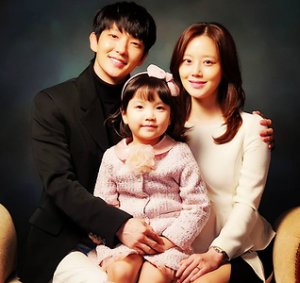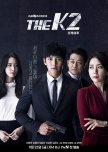
Cette critique peut contenir des spoilers
A botched fairytale attempt
In the words of one of my favourite reviewers, Autumn Topping, The K2 is a modern retelling of Snow White that raises the question of "What if the Evil Queen fell in love with the Huntsman, but the Huntsman fell for Snow White instead?".Although I watch this drama years ago...I'm finally able to properly word my thoughts.
Despite the fact that Ji Chang Wook is not my favourite actor, I enjoy him enough to have high expectations for this production. To begin on a good note, I must state that The K2 delivered on the action front with intensity (with some over the top exceptions). Now I will review each section of the good and the bad of this show.
Starting off with the romance. Oh god, where do I being? Je Ha and Yoo Jin's chemistry....let's just say I found myself sitting in agony as I question why I had to put up with Je Ha's childish crush on An Na. And I mean childish as in immature.
The main leads relationship had no chemistry and even pushed me to believe that the true stars of the show were Yoo Jin and Je Ha.
There were many moments in the show where it had reached a point where rationality no longer mattered.
It attempted to make a tale out of plainly improbable events, a massive cluster of plotholes, and outright ludicrous ideas.
An example of such an illogical plot was during Je Ha's first love's back story. His first love is Iraqi, she's entirely dressed in a gown and hijab at all times, but magically she chooses to throw off her veil and liplock with her "hero" only because he suggested they married. NOT EVEN A PROPER PROPOSAL!!! Her ONLY purpose was to die in order to create motivation for Ji Chan Wook's character to get involved in the action. She had nearly no dreams, hopes, or realistic goals.
On that note, I might as well mention the most cringe-worthy scene in all of drama romance history. Despite the fact that Je Ha is a mercenary soldier, he squeals while seeing An Na prepare ramen. As if that is the world cutest, most precious, never before been done action in the world. If I could show you all how much I rolled my eyes, I would.
There are numerous simple plot devices just holding up to spring out from all sides at the final moment to spare and draw out the show, and they're all exceedingly wry.
To summarise, The K2 was successful in generating exciting action moments, but the storyline struggled to match them. The drama started strong with a good setup in the first third, but it didn't seem to have much of a narrative to tell after that. Ji Chang Wook had a strong performance, yet some of his impacts were lost due to a lack of connection with An Na's character. This drama has enough decent things in it to appeal to fans of action and political manoeuvring, as well as Ji Chang Wook fans. While it didn't quite meet my expectations, it was a decent watch overall. I may revisit the drama a few years down the road, but I doubt my opinion will change.
X0X0 <3
---Taemangi
Cet avis était-il utile?
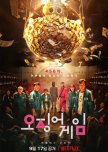
Cette critique peut contenir des spoilers
Here’s What You’re Not Missing, spoiler Alert: Nothing New
I normally take many months or years before I review shows and movies. This peculiar routine has allowed me to objectively think and analyze shows better. Although it's only been a few months, I can't help but want to either save someone from wasting their time or help someone discovers what will soon be one of their favourite shows.Squid Game is a thought-provoking television show on the one hand. It was all around made with wonderful cinematography, frequent violence, occasional sexually explicit, and contains a caustic caricature of income inequity.
On the other hand, it is a widely used theme across the world. Wealthy and privileged people play games with the lives of those who are less fortunate. You can definitely see it as catering to its audience's twisted inner child. The vividly coloured, massive playground (both theoretically and literally). I didn't find anything remotely fresh and innovative in this plot.
The show tried too hard and failed horribly to persuade its viewers that everyone is evil simultaneously ( the wealthy gamblers and/or the less fortunate players). As I previously indicated, it attempted to shed light on a topic that we have all encountered and are all too familiar with: when their lives and money are on the line, all human beings become morally corrupt barbarians.
Despite the large ensemble, the premise is glaringly obvious and plain. And the failed comedic portions about the terrible billionaires who come to wager on the game have the personality and dialogues I would come up with as an elementary student when imagining the lives of the top 1 per cent—blatantly laughable and unrealistic. The drama attempted to be more meaningful than it was. It tried desperately to squeeze the viewer's perceptions of individuals and circumstances into overused cliches—restricting itself with its inane jargon, particularly at the climax.
In its attempts at distorting and layering the audience's perception of characters, only around five or six characters were developed decently out of hundreds. The rest of the hundred could have led to great possibilities but they simply remained as food for powder. At first, you may think that some characters appear to be well-developed, but you'll easily find them inexpensive pawns for conveying the drama's fundamental theme.
An example of that being, the covert police officer plot feeling unessential. I will give it the positive recognition of it being thrilling in its own particular manner. However, his only purpose in the drama is to give the audience a peek of the cruelty that goes on behind the scenes. His sole purpose, in the end, was to provide the audience with an inexpensive perspective to look through.
In conclusion, it's a show you should only watch once if you've run out of things to watch. Although director Hwang Dong-hyuk has announced a season 2, I might watch it if it contains a different cast, but it's not necessary. It was terrifying, but not in the conventional sense of a Korean drama that delves into philosophy and morality. Like justice and equality.
If a show that supposedly wishes to contain true philosophical, psychological, and morality v.s. values themes, that show must challenge me in all those aspects and mentally as well as emotionally. That being said, Squid Game definitely did not do any of that. As my last attempt at holding a candlelit for this disastrous show, I will watch the second season and form an opinion that is un-bias and not affected by my opinions of this season.
My final words to you as an audience is to watch at your own risk. You'll either gain dissatisfaction or attain satisfaction.
X0X0 <3
---Taemangi
Cet avis était-il utile?
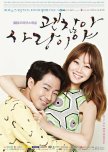
It's Okay, That's Love
2 personnes ont trouvé cette critique utile
A compelling concept, thought-provoking dilemmas, and an engrossing story.
This is what’s ridiculous; people who are suffering from cancer, or from severed limbs or people who are blind receive sympathy from others in this world but people suffering from mental illness are viewed as outcasts by everyone – as if they are diseased or something.— Dong Min / Sung Dong Il
This series is indeed a compelling drama to watch! I applaud this series for being brave enough to address delicate topics, particularly in the area of mental health. I admire the creators of this show for confronting prejudice and social stigma against persons with mental illnesses. They did an amazing job of breaking the taboo and delivering an eye-opening piece of art.
This show has effectively caught my eye. It provoked my curiosity to perceive what might occur straightaway. It functions admirably with a wide scope of feelings. The sweet, insightful, despairing storyline, nice pacing, and a pitch-amazing outfit layered the film.
The characters have such a realistic portrayal as neither one of them are "perfect." Despite their inside inconveniences and pasts, they are both broken individuals who figure out how to love each other.
Sung Dong-Il may come across as unnecessarily boisterous at times, but he genuinely portrays his scenes brilliantly. There is some optional sentiment in this, but you'll have to decide for yourself. The relationships between the housemates and their companions are at first somewhat befuddling from the get-go, but you either get used to it, or they somehow appear to co-exist. That being said, this show has really touching elements. It has an intangible element that makes the audience feel wonderful and make them grin all the way around. It will drive you into a tizzy of emotions, causing you to cry and laugh at the same moment.
"It's Okay, That's Love" is an excellent heap of adoration and good faith sprinkled with spaces of odd, as I would like to think. It was light, mitigating, and inspiring regardless of its mental topic. An amazing series with a convincing plot, powerful contentions, and extraordinary exhibitions from the group that will make a permanent imprint on the hearts, all things considered. The out-of-the-container idea is the thing that makes this an exceptional gem of a show.
X0X0 <3
---Taemangi
Cet avis était-il utile?
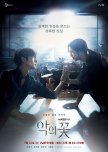
A character driven story.
Flower Of Evil is one of those shows that takes you entirely by surprise.Shows are frequently overhyped, but they often can demonstrate their worthiness of being hyped up. This slow-burn thriller is a brilliantly written show that easily jumps between genres while never losing sight of its central idea. It's a show that deserved to win the Asia Artist Awards as well as the Baeksang Arts Award that it attained.
The story itself is played as a combination of a procedural crime drama and a cat and mouse thriller. Even after weeks of finishing this drama, the characters, themes, and plots didn't let me go, nor did I wish to let go.
This is a winding thriller, and you'll want to watch this very delicate and shocking story to the end.
There are some great moments that will surprise you. I can't select which of the many strong goodies in the drama to highlight first. The primary characters? The supporting cast? What about the acting? What about the writing?
The tone shifts slightly when we learn more about Hee-Sung's intentions. These tonal swings eventually move into the realm of romance. The first thing you notice when you start the drama is one of the most touching married couple you've ever seen in the drama world, accompanied by their lovely little daughter.
There's something you can't notice straight away, as the storey synopsis already implies. Something that begins to rip those nicely constructed barriers down from within. Hee-Sung is suspected of being the perpetrator of a series of mysterious murders. Hee-Sung quickly reveals that he is not who he appears to be, adopting a false character and being unable to feel any emotions. Adopting a fake persona and unable to feel any emotions, it soon becomes apparent that Hee-Sung is not at all what he seems. However, being experienced with a lot of crime tropes, I sensed there was something fishy about the dark past they were trying to sell me. How far can a drama go with the main character being the bad guy? Could he be the one who killed these people? Is it possible that something else is at work here? That question followed me around like a shadow while my suspicions grew.
The finale removes some wind from the sails. It is mainly used to wrap everything in a neat bow, borrowing some proven Kdrama metaphors. Moon Chae Won and Lee Jun Gi's acting is exemplary, and both have plenty of room to play a role that really relies on their emotional performance.
There's definitely a lot of tension here, from the mob boss tying up Hee Sung and threatening to set the room on fire, to our heroes slowly lining up in a water-filled pool. This is completely contrary to Ji Won's police investigation, as she is torn between her obligations and her relationship with Hee Sung.
This relationship really moves the story forward. Unlike many Korean dramas, Flower Of Evil takes time to turn this simple love story into a much more complex case than the misunderstandings we've seen. It is that the chemistry between the two is very powerful and both help to nourish each other and enhance their achievements.
I do have to admit that at times the tempo is a little off. There are a few barely noticeable lulls along the way.
I have the ability to without a doubt say, Flower Of Evil is a fantastic drama. It's the ability to combine the romantic, dramatic, and action-packed genres without becoming bogged down in its own convoluted plot is amazing.
This one is definitely worth checking out if you haven't already!
X0X0 <3
---Taemango
Cet avis était-il utile?

